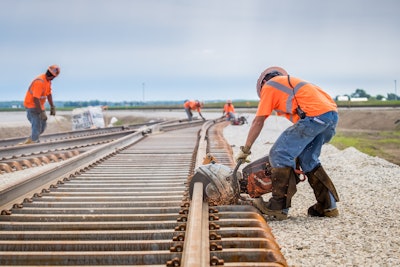
According to the Associated Builders and Contractors (ABC), the construction industry will need to attract nearly 650,000 additional workers on top of the normal pace of hiring in 2022 to meet the demand for labor.
This summer, the Biden-Harris Administration has announced the Talent Pipeline Challenge to fill these jobs and encourages employers and state and local governments to use $800 million in job training funds from the $1 trillion Infrastructure Investment & Jobs Act (IIJA) to do so. A White House fact sheet says that more money for the program will come from the American Rescue Program rescue package to continue to boost the supply of workers for these jobs.
"This is a nationwide call to action for employers, education and training providers, states, local, Tribal, and territorial governments, and philanthropic organizations to make tangible commitments that support equitable workforce development," the White House said.
The focus of the program will be on three main sectors: Broadband, Construction and “Electrification” (EV Charging Infrastructure and Battery Manufacturing). It encourages employers to partner with and hire skilled workers from at least one training provider in each region in which the employer has operations, such as a registered apprenticeship program or a community college with a diverse student population. As part of this pledge, employers can partner with national or regional intermediaries or training providers to build, scale, or support local training models to recruit, train, or hire workers in their sector. The White House says training partnerships will build on pathways to quality jobs for women, people of color and underserved workers— including those from rural and Tribal communities and communities with persistent poverty.
The Administration is also asking state, local, Tribal and territorial governments to commit to use federal funding to invest in workforce development efforts in these critical sectors through the following means:
- Use federal funding to invest in workforce development efforts in these critical sectors, including:
- American Rescue Plan (ARP) State and Local Fiscal Recovery Funds toward job training and other assistance to workers negatively affected by the pandemic.
- Bipartisan Infrastructure Law grant funding, where possible and legally permissible, to support workforce development aligned to project labor needs.
- State Workforce Innovation and Opportunity Act (WIOA) Reserve dollars to fund place-based labor-management partnerships in infrastructure sectors, with apprenticeships and pre-apprenticeship opportunities.
- Serve as a regional convenor of employers, training, and community partners to identify workforce needs and develop a regional workforce training plan.
- Make a model employer commitment, prioritizing hiring of workers and small businesses in their community for state and local projects and developing diverse hiring goals.
- Encourage contractors, where permissible under applicable law, to use local/economic hiring preferences to expand the diversity of the talent pool and build local talent.
- Adapt career and technical education plans (i.e., Perkins State Plan) to meet new workforce needs created by the Bipartisan Infrastructure Law.
An "Exclusionary Policy"
The program seems like a good first step by the Biden Administration to the recognize the skilled labor shortage and how it is making it difficult to deliver on the IIJA and other taxpayer investments in America’s infrastructure in an efficient and economical manner.
While the need for talent is real, experts in the industry fear this program is misguided and features exclusionary and anti-competitive measures that will exacerbate the skilled labor shortage.
“Unfortunately, the Biden administration’s policies, such as those promoting government-mandated project labor agreements on federal and federally assisted construction projects, will further exacerbate the skilled labor shortage and increase costs," Ben Brubeck, ABC vice president of regulatory, labor and state affairs says. "(These programs) are designed to exclude 87% of the construction workforce and qualified businesses who have chosen not to affiliate with labor unions from rebuilding America.
“ABC calls on the Biden administration to abandon its exclusionary policies that discourage competition from quality merit shop firms and employees who build the people who build America, safely, on time, on budget and enjoy good paying wages and benefits. Instead, this administration must create policies that create opportunities for all of the 7.7 million people in the construction industry and help deliver the best product at the best price for the American people.”
The Biden Administration has made it clear they aim to push unionized work and the ABC has continued to warn against it, stating that these policies will only drive up costs, reduce competition from contractors and artificially shrink the pool of qualified construction labor needed to build these projects.
ABC has urged regulators to avoid any language or additional regulatory actions that might limit opportunities for experienced and quality contractors and skilled construction workers that already build these projects from winning contracts in order to keep projects and progress moving.



















